Development of Social Policy and Attitudes Towards Poverty Analysis
VerifiedAdded on 2022/08/22
|10
|2946
|23
Essay
AI Summary
This essay provides a comprehensive analysis of the development of social welfare in the United Kingdom, starting with a historical perspective that examines the societal and economic factors influencing social policy prior to the 19th century. It details the impact of events like the Black Death and the French Revolution on poverty and social attitudes. The essay then explores changing attitudes and views on social welfare reforms from the 19th century onward, drawing on primary and secondary sources to illustrate the evolution of social welfare programs and the shifting perspectives of various stakeholders. The concepts of need, absolute poverty, and relative poverty are defined and analyzed, alongside a discussion of the impact of limited resources on the state's ability to prioritize social welfare initiatives. Finally, the essay examines the post-war development of social welfare issues, highlighting challenges such as poverty, unemployment, and healthcare disparities, and the reforms that emerged in response. This essay offers a detailed overview of the development of social welfare.
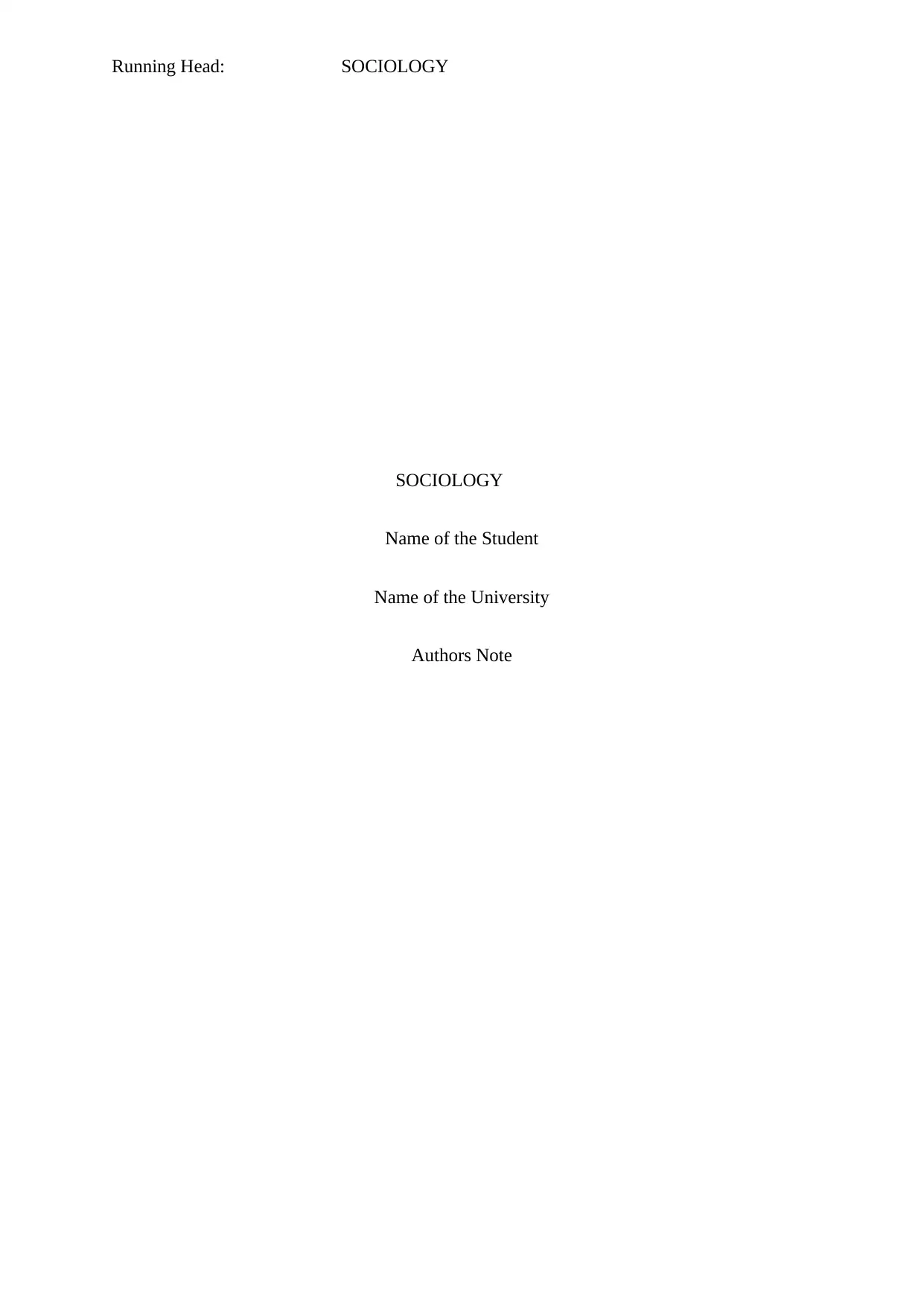
Running Head: SOCIOLOGY
SOCIOLOGY
Name of the Student
Name of the University
Authors Note
SOCIOLOGY
Name of the Student
Name of the University
Authors Note
Paraphrase This Document
Need a fresh take? Get an instant paraphrase of this document with our AI Paraphraser
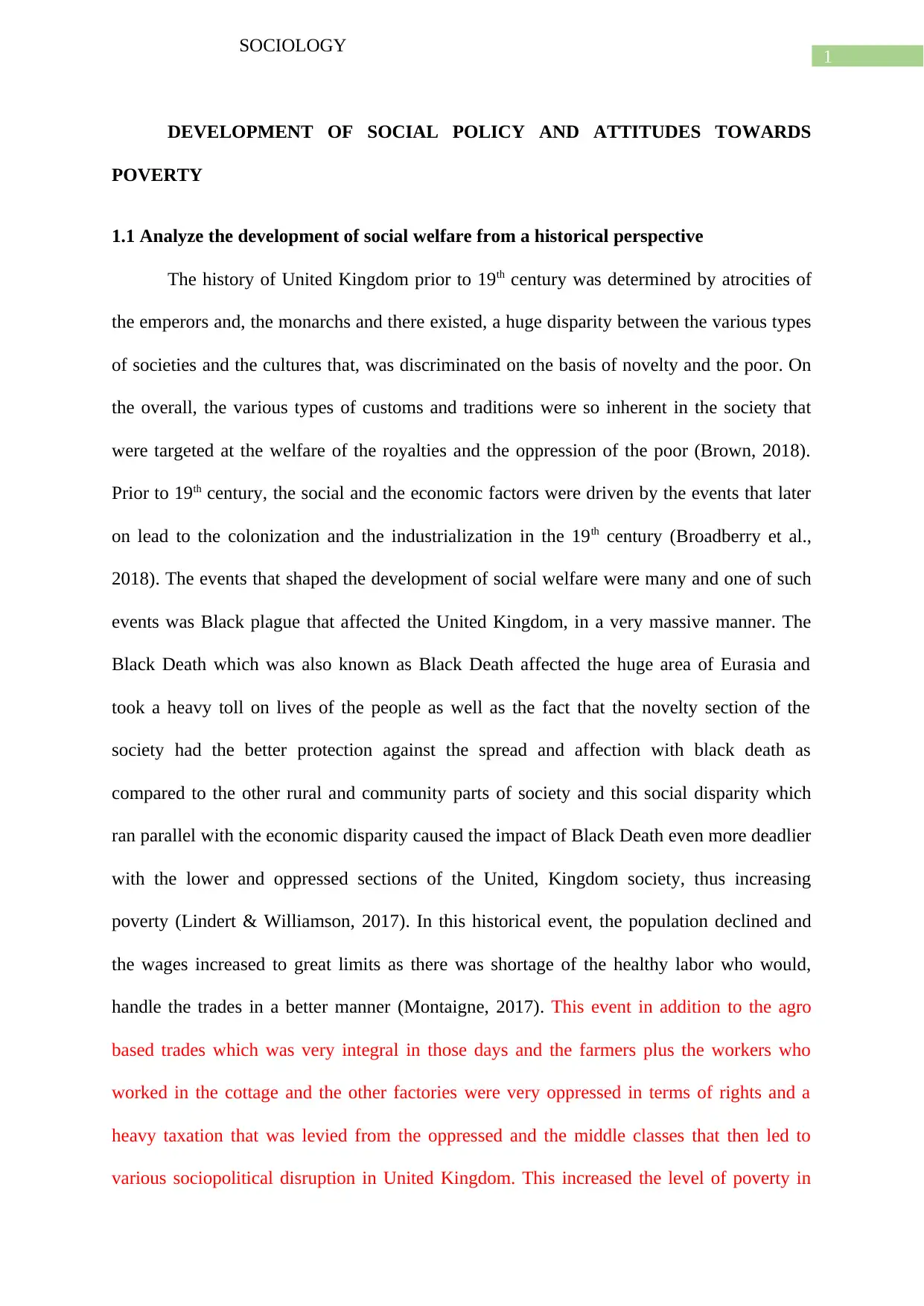
1
SOCIOLOGY
DEVELOPMENT OF SOCIAL POLICY AND ATTITUDES TOWARDS
POVERTY
1.1 Analyze the development of social welfare from a historical perspective
The history of United Kingdom prior to 19th century was determined by atrocities of
the emperors and, the monarchs and there existed, a huge disparity between the various types
of societies and the cultures that, was discriminated on the basis of novelty and the poor. On
the overall, the various types of customs and traditions were so inherent in the society that
were targeted at the welfare of the royalties and the oppression of the poor (Brown, 2018).
Prior to 19th century, the social and the economic factors were driven by the events that later
on lead to the colonization and the industrialization in the 19th century (Broadberry et al.,
2018). The events that shaped the development of social welfare were many and one of such
events was Black plague that affected the United Kingdom, in a very massive manner. The
Black Death which was also known as Black Death affected the huge area of Eurasia and
took a heavy toll on lives of the people as well as the fact that the novelty section of the
society had the better protection against the spread and affection with black death as
compared to the other rural and community parts of society and this social disparity which
ran parallel with the economic disparity caused the impact of Black Death even more deadlier
with the lower and oppressed sections of the United, Kingdom society, thus increasing
poverty (Lindert & Williamson, 2017). In this historical event, the population declined and
the wages increased to great limits as there was shortage of the healthy labor who would,
handle the trades in a better manner (Montaigne, 2017). This event in addition to the agro
based trades which was very integral in those days and the farmers plus the workers who
worked in the cottage and the other factories were very oppressed in terms of rights and a
heavy taxation that was levied from the oppressed and the middle classes that then led to
various sociopolitical disruption in United Kingdom. This increased the level of poverty in
SOCIOLOGY
DEVELOPMENT OF SOCIAL POLICY AND ATTITUDES TOWARDS
POVERTY
1.1 Analyze the development of social welfare from a historical perspective
The history of United Kingdom prior to 19th century was determined by atrocities of
the emperors and, the monarchs and there existed, a huge disparity between the various types
of societies and the cultures that, was discriminated on the basis of novelty and the poor. On
the overall, the various types of customs and traditions were so inherent in the society that
were targeted at the welfare of the royalties and the oppression of the poor (Brown, 2018).
Prior to 19th century, the social and the economic factors were driven by the events that later
on lead to the colonization and the industrialization in the 19th century (Broadberry et al.,
2018). The events that shaped the development of social welfare were many and one of such
events was Black plague that affected the United Kingdom, in a very massive manner. The
Black Death which was also known as Black Death affected the huge area of Eurasia and
took a heavy toll on lives of the people as well as the fact that the novelty section of the
society had the better protection against the spread and affection with black death as
compared to the other rural and community parts of society and this social disparity which
ran parallel with the economic disparity caused the impact of Black Death even more deadlier
with the lower and oppressed sections of the United, Kingdom society, thus increasing
poverty (Lindert & Williamson, 2017). In this historical event, the population declined and
the wages increased to great limits as there was shortage of the healthy labor who would,
handle the trades in a better manner (Montaigne, 2017). This event in addition to the agro
based trades which was very integral in those days and the farmers plus the workers who
worked in the cottage and the other factories were very oppressed in terms of rights and a
heavy taxation that was levied from the oppressed and the middle classes that then led to
various sociopolitical disruption in United Kingdom. This increased the level of poverty in
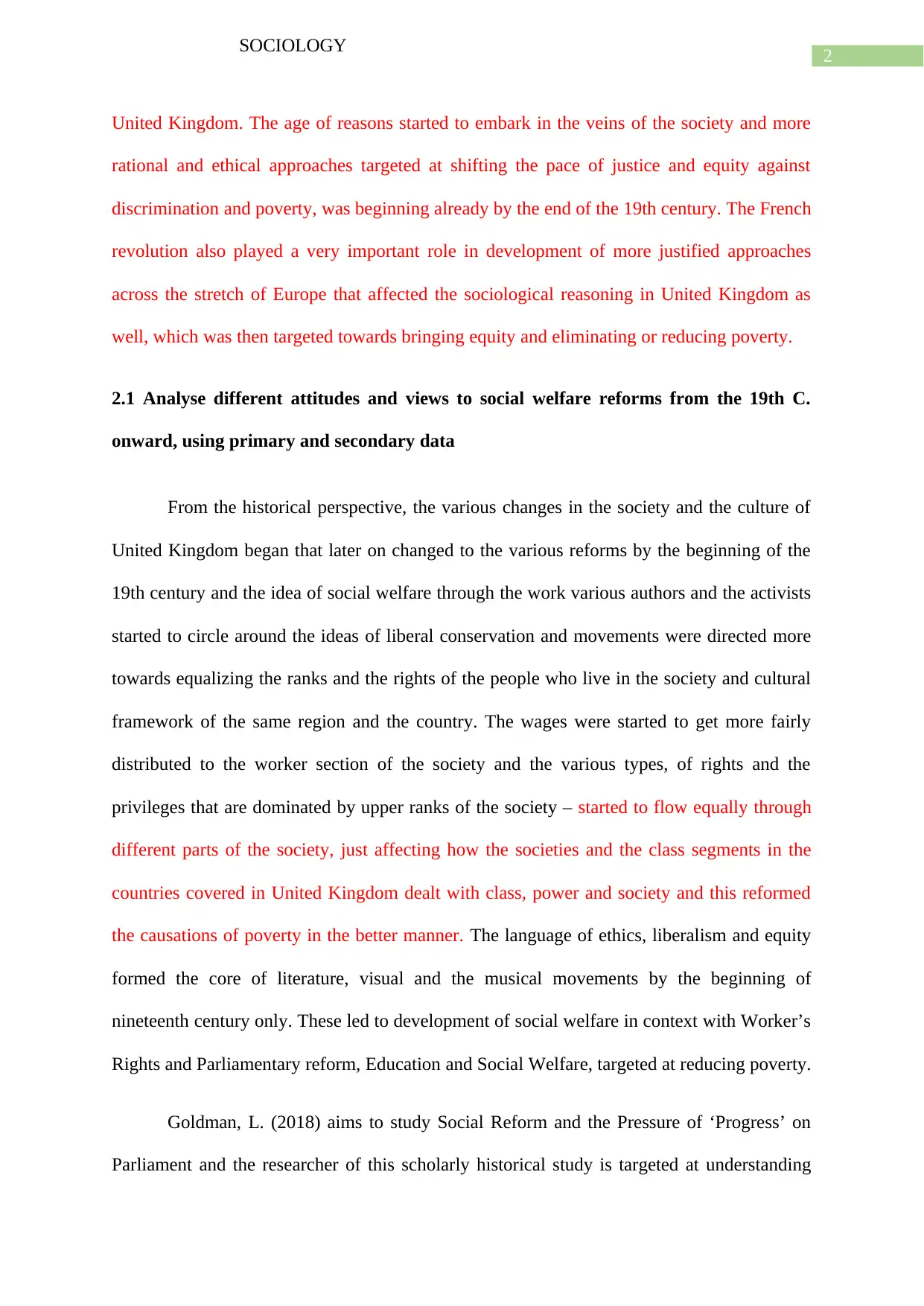
2
SOCIOLOGY
United Kingdom. The age of reasons started to embark in the veins of the society and more
rational and ethical approaches targeted at shifting the pace of justice and equity against
discrimination and poverty, was beginning already by the end of the 19th century. The French
revolution also played a very important role in development of more justified approaches
across the stretch of Europe that affected the sociological reasoning in United Kingdom as
well, which was then targeted towards bringing equity and eliminating or reducing poverty.
2.1 Analyse different attitudes and views to social welfare reforms from the 19th C.
onward, using primary and secondary data
From the historical perspective, the various changes in the society and the culture of
United Kingdom began that later on changed to the various reforms by the beginning of the
19th century and the idea of social welfare through the work various authors and the activists
started to circle around the ideas of liberal conservation and movements were directed more
towards equalizing the ranks and the rights of the people who live in the society and cultural
framework of the same region and the country. The wages were started to get more fairly
distributed to the worker section of the society and the various types, of rights and the
privileges that are dominated by upper ranks of the society – started to flow equally through
different parts of the society, just affecting how the societies and the class segments in the
countries covered in United Kingdom dealt with class, power and society and this reformed
the causations of poverty in the better manner. The language of ethics, liberalism and equity
formed the core of literature, visual and the musical movements by the beginning of
nineteenth century only. These led to development of social welfare in context with Worker’s
Rights and Parliamentary reform, Education and Social Welfare, targeted at reducing poverty.
Goldman, L. (2018) aims to study Social Reform and the Pressure of ‘Progress’ on
Parliament and the researcher of this scholarly historical study is targeted at understanding
SOCIOLOGY
United Kingdom. The age of reasons started to embark in the veins of the society and more
rational and ethical approaches targeted at shifting the pace of justice and equity against
discrimination and poverty, was beginning already by the end of the 19th century. The French
revolution also played a very important role in development of more justified approaches
across the stretch of Europe that affected the sociological reasoning in United Kingdom as
well, which was then targeted towards bringing equity and eliminating or reducing poverty.
2.1 Analyse different attitudes and views to social welfare reforms from the 19th C.
onward, using primary and secondary data
From the historical perspective, the various changes in the society and the culture of
United Kingdom began that later on changed to the various reforms by the beginning of the
19th century and the idea of social welfare through the work various authors and the activists
started to circle around the ideas of liberal conservation and movements were directed more
towards equalizing the ranks and the rights of the people who live in the society and cultural
framework of the same region and the country. The wages were started to get more fairly
distributed to the worker section of the society and the various types, of rights and the
privileges that are dominated by upper ranks of the society – started to flow equally through
different parts of the society, just affecting how the societies and the class segments in the
countries covered in United Kingdom dealt with class, power and society and this reformed
the causations of poverty in the better manner. The language of ethics, liberalism and equity
formed the core of literature, visual and the musical movements by the beginning of
nineteenth century only. These led to development of social welfare in context with Worker’s
Rights and Parliamentary reform, Education and Social Welfare, targeted at reducing poverty.
Goldman, L. (2018) aims to study Social Reform and the Pressure of ‘Progress’ on
Parliament and the researcher of this scholarly historical study is targeted at understanding
⊘ This is a preview!⊘
Do you want full access?
Subscribe today to unlock all pages.

Trusted by 1+ million students worldwide
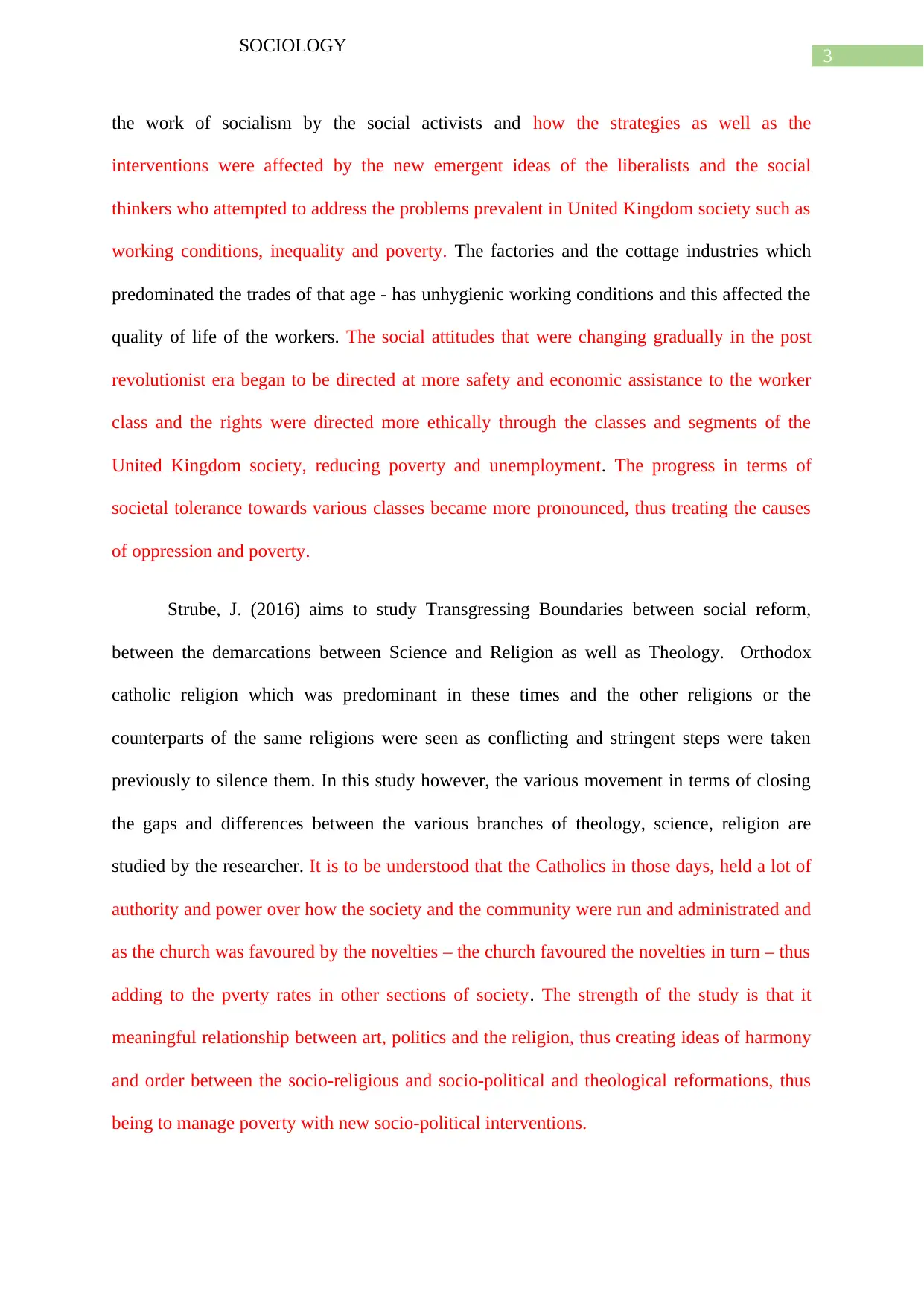
3
SOCIOLOGY
the work of socialism by the social activists and how the strategies as well as the
interventions were affected by the new emergent ideas of the liberalists and the social
thinkers who attempted to address the problems prevalent in United Kingdom society such as
working conditions, inequality and poverty. The factories and the cottage industries which
predominated the trades of that age - has unhygienic working conditions and this affected the
quality of life of the workers. The social attitudes that were changing gradually in the post
revolutionist era began to be directed at more safety and economic assistance to the worker
class and the rights were directed more ethically through the classes and segments of the
United Kingdom society, reducing poverty and unemployment. The progress in terms of
societal tolerance towards various classes became more pronounced, thus treating the causes
of oppression and poverty.
Strube, J. (2016) aims to study Transgressing Boundaries between social reform,
between the demarcations between Science and Religion as well as Theology. Orthodox
catholic religion which was predominant in these times and the other religions or the
counterparts of the same religions were seen as conflicting and stringent steps were taken
previously to silence them. In this study however, the various movement in terms of closing
the gaps and differences between the various branches of theology, science, religion are
studied by the researcher. It is to be understood that the Catholics in those days, held a lot of
authority and power over how the society and the community were run and administrated and
as the church was favoured by the novelties – the church favoured the novelties in turn – thus
adding to the pverty rates in other sections of society. The strength of the study is that it
meaningful relationship between art, politics and the religion, thus creating ideas of harmony
and order between the socio-religious and socio-political and theological reformations, thus
being to manage poverty with new socio-political interventions.
SOCIOLOGY
the work of socialism by the social activists and how the strategies as well as the
interventions were affected by the new emergent ideas of the liberalists and the social
thinkers who attempted to address the problems prevalent in United Kingdom society such as
working conditions, inequality and poverty. The factories and the cottage industries which
predominated the trades of that age - has unhygienic working conditions and this affected the
quality of life of the workers. The social attitudes that were changing gradually in the post
revolutionist era began to be directed at more safety and economic assistance to the worker
class and the rights were directed more ethically through the classes and segments of the
United Kingdom society, reducing poverty and unemployment. The progress in terms of
societal tolerance towards various classes became more pronounced, thus treating the causes
of oppression and poverty.
Strube, J. (2016) aims to study Transgressing Boundaries between social reform,
between the demarcations between Science and Religion as well as Theology. Orthodox
catholic religion which was predominant in these times and the other religions or the
counterparts of the same religions were seen as conflicting and stringent steps were taken
previously to silence them. In this study however, the various movement in terms of closing
the gaps and differences between the various branches of theology, science, religion are
studied by the researcher. It is to be understood that the Catholics in those days, held a lot of
authority and power over how the society and the community were run and administrated and
as the church was favoured by the novelties – the church favoured the novelties in turn – thus
adding to the pverty rates in other sections of society. The strength of the study is that it
meaningful relationship between art, politics and the religion, thus creating ideas of harmony
and order between the socio-religious and socio-political and theological reformations, thus
being to manage poverty with new socio-political interventions.
Paraphrase This Document
Need a fresh take? Get an instant paraphrase of this document with our AI Paraphraser
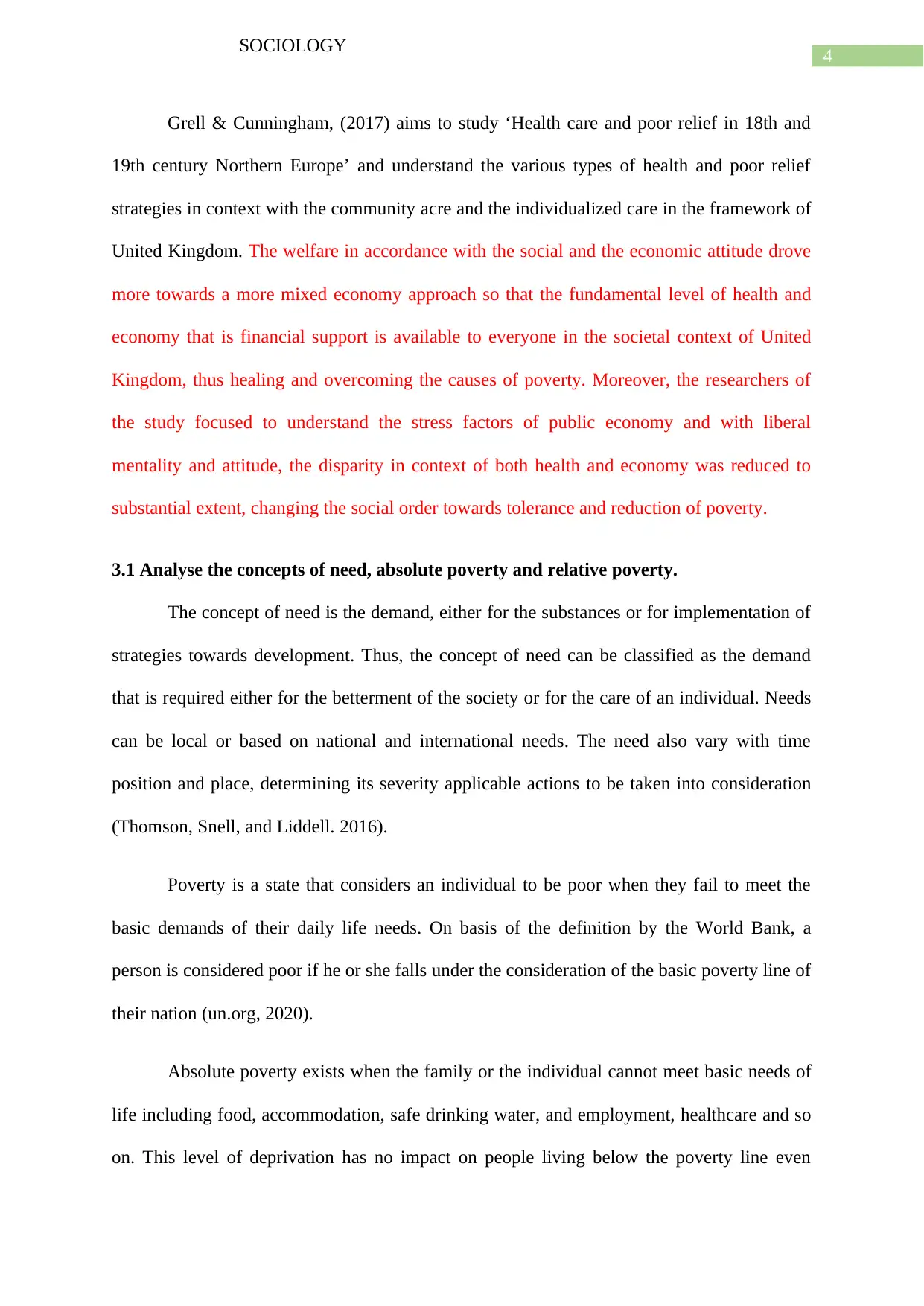
4
SOCIOLOGY
Grell & Cunningham, (2017) aims to study ‘Health care and poor relief in 18th and
19th century Northern Europe’ and understand the various types of health and poor relief
strategies in context with the community acre and the individualized care in the framework of
United Kingdom. The welfare in accordance with the social and the economic attitude drove
more towards a more mixed economy approach so that the fundamental level of health and
economy that is financial support is available to everyone in the societal context of United
Kingdom, thus healing and overcoming the causes of poverty. Moreover, the researchers of
the study focused to understand the stress factors of public economy and with liberal
mentality and attitude, the disparity in context of both health and economy was reduced to
substantial extent, changing the social order towards tolerance and reduction of poverty.
3.1 Analyse the concepts of need, absolute poverty and relative poverty.
The concept of need is the demand, either for the substances or for implementation of
strategies towards development. Thus, the concept of need can be classified as the demand
that is required either for the betterment of the society or for the care of an individual. Needs
can be local or based on national and international needs. The need also vary with time
position and place, determining its severity applicable actions to be taken into consideration
(Thomson, Snell, and Liddell. 2016).
Poverty is a state that considers an individual to be poor when they fail to meet the
basic demands of their daily life needs. On basis of the definition by the World Bank, a
person is considered poor if he or she falls under the consideration of the basic poverty line of
their nation (un.org, 2020).
Absolute poverty exists when the family or the individual cannot meet basic needs of
life including food, accommodation, safe drinking water, and employment, healthcare and so
on. This level of deprivation has no impact on people living below the poverty line even
SOCIOLOGY
Grell & Cunningham, (2017) aims to study ‘Health care and poor relief in 18th and
19th century Northern Europe’ and understand the various types of health and poor relief
strategies in context with the community acre and the individualized care in the framework of
United Kingdom. The welfare in accordance with the social and the economic attitude drove
more towards a more mixed economy approach so that the fundamental level of health and
economy that is financial support is available to everyone in the societal context of United
Kingdom, thus healing and overcoming the causes of poverty. Moreover, the researchers of
the study focused to understand the stress factors of public economy and with liberal
mentality and attitude, the disparity in context of both health and economy was reduced to
substantial extent, changing the social order towards tolerance and reduction of poverty.
3.1 Analyse the concepts of need, absolute poverty and relative poverty.
The concept of need is the demand, either for the substances or for implementation of
strategies towards development. Thus, the concept of need can be classified as the demand
that is required either for the betterment of the society or for the care of an individual. Needs
can be local or based on national and international needs. The need also vary with time
position and place, determining its severity applicable actions to be taken into consideration
(Thomson, Snell, and Liddell. 2016).
Poverty is a state that considers an individual to be poor when they fail to meet the
basic demands of their daily life needs. On basis of the definition by the World Bank, a
person is considered poor if he or she falls under the consideration of the basic poverty line of
their nation (un.org, 2020).
Absolute poverty exists when the family or the individual cannot meet basic needs of
life including food, accommodation, safe drinking water, and employment, healthcare and so
on. This level of deprivation has no impact on people living below the poverty line even
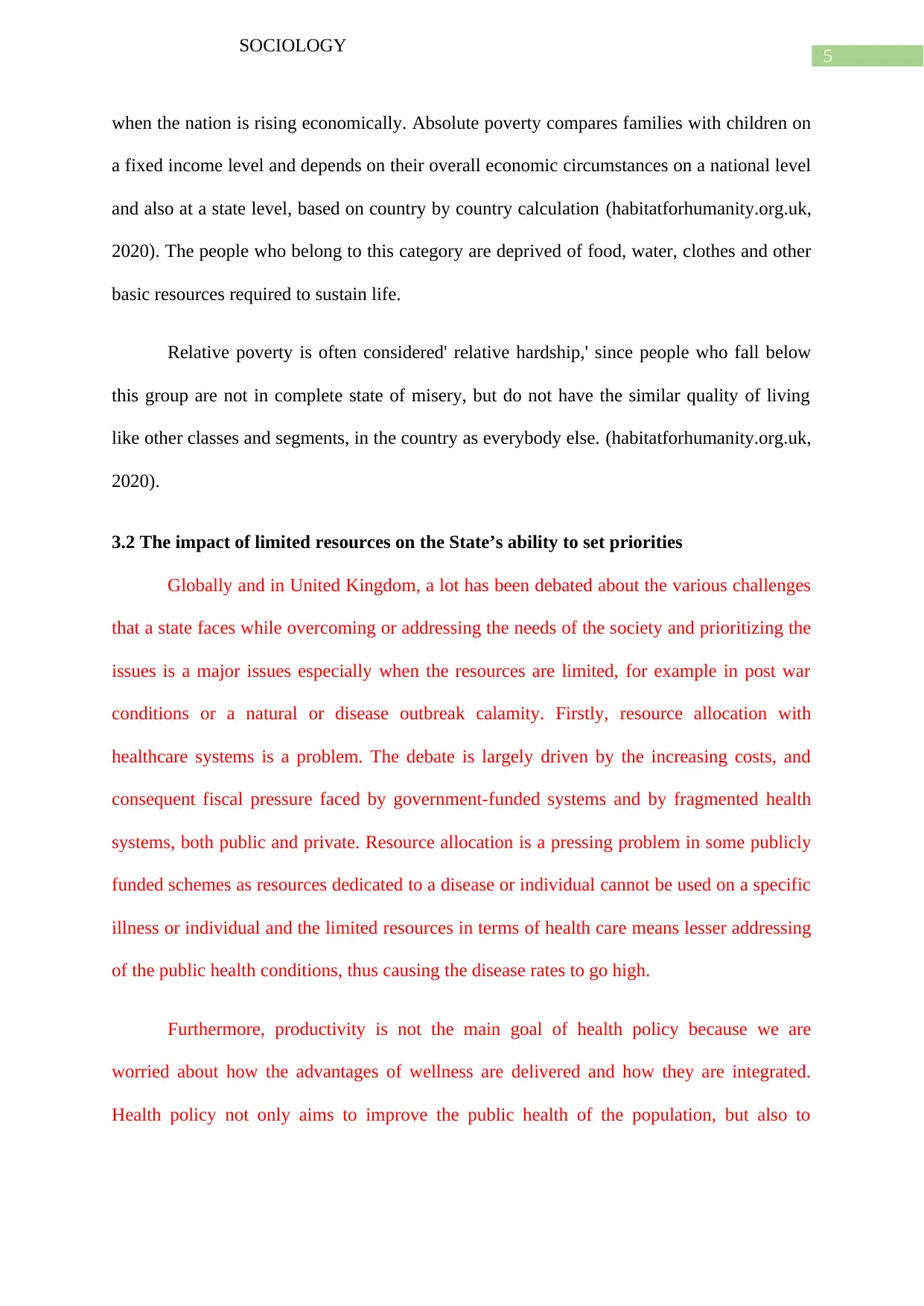
5
SOCIOLOGY
when the nation is rising economically. Absolute poverty compares families with children on
a fixed income level and depends on their overall economic circumstances on a national level
and also at a state level, based on country by country calculation (habitatforhumanity.org.uk,
2020). The people who belong to this category are deprived of food, water, clothes and other
basic resources required to sustain life.
Relative poverty is often considered' relative hardship,' since people who fall below
this group are not in complete state of misery, but do not have the similar quality of living
like other classes and segments, in the country as everybody else. (habitatforhumanity.org.uk,
2020).
3.2 The impact of limited resources on the State’s ability to set priorities
Globally and in United Kingdom, a lot has been debated about the various challenges
that a state faces while overcoming or addressing the needs of the society and prioritizing the
issues is a major issues especially when the resources are limited, for example in post war
conditions or a natural or disease outbreak calamity. Firstly, resource allocation with
healthcare systems is a problem. The debate is largely driven by the increasing costs, and
consequent fiscal pressure faced by government-funded systems and by fragmented health
systems, both public and private. Resource allocation is a pressing problem in some publicly
funded schemes as resources dedicated to a disease or individual cannot be used on a specific
illness or individual and the limited resources in terms of health care means lesser addressing
of the public health conditions, thus causing the disease rates to go high.
Furthermore, productivity is not the main goal of health policy because we are
worried about how the advantages of wellness are delivered and how they are integrated.
Health policy not only aims to improve the public health of the population, but also to
SOCIOLOGY
when the nation is rising economically. Absolute poverty compares families with children on
a fixed income level and depends on their overall economic circumstances on a national level
and also at a state level, based on country by country calculation (habitatforhumanity.org.uk,
2020). The people who belong to this category are deprived of food, water, clothes and other
basic resources required to sustain life.
Relative poverty is often considered' relative hardship,' since people who fall below
this group are not in complete state of misery, but do not have the similar quality of living
like other classes and segments, in the country as everybody else. (habitatforhumanity.org.uk,
2020).
3.2 The impact of limited resources on the State’s ability to set priorities
Globally and in United Kingdom, a lot has been debated about the various challenges
that a state faces while overcoming or addressing the needs of the society and prioritizing the
issues is a major issues especially when the resources are limited, for example in post war
conditions or a natural or disease outbreak calamity. Firstly, resource allocation with
healthcare systems is a problem. The debate is largely driven by the increasing costs, and
consequent fiscal pressure faced by government-funded systems and by fragmented health
systems, both public and private. Resource allocation is a pressing problem in some publicly
funded schemes as resources dedicated to a disease or individual cannot be used on a specific
illness or individual and the limited resources in terms of health care means lesser addressing
of the public health conditions, thus causing the disease rates to go high.
Furthermore, productivity is not the main goal of health policy because we are
worried about how the advantages of wellness are delivered and how they are integrated.
Health policy not only aims to improve the public health of the population, but also to
⊘ This is a preview!⊘
Do you want full access?
Subscribe today to unlock all pages.

Trusted by 1+ million students worldwide
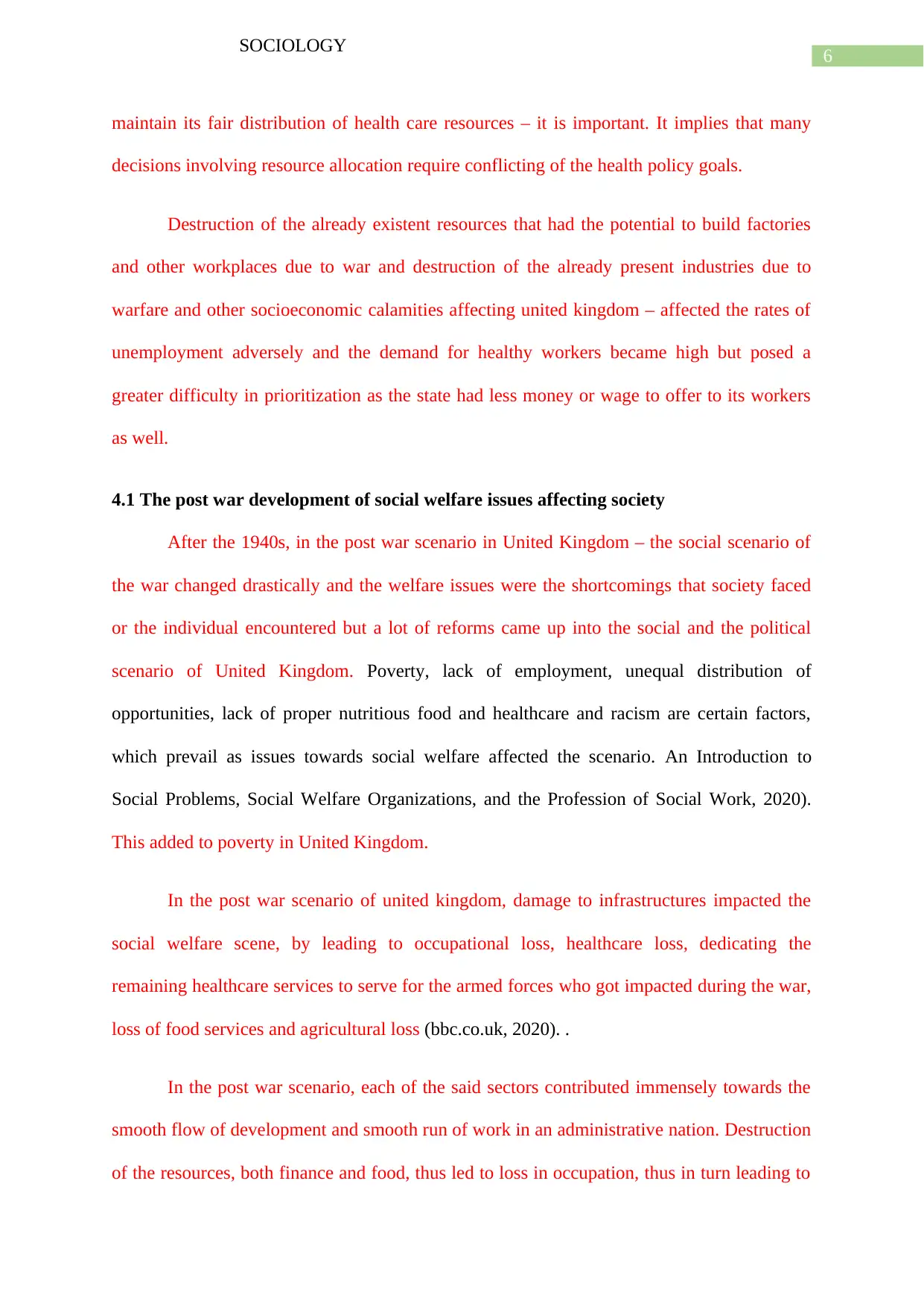
6
SOCIOLOGY
maintain its fair distribution of health care resources – it is important. It implies that many
decisions involving resource allocation require conflicting of the health policy goals.
Destruction of the already existent resources that had the potential to build factories
and other workplaces due to war and destruction of the already present industries due to
warfare and other socioeconomic calamities affecting united kingdom – affected the rates of
unemployment adversely and the demand for healthy workers became high but posed a
greater difficulty in prioritization as the state had less money or wage to offer to its workers
as well.
4.1 The post war development of social welfare issues affecting society
After the 1940s, in the post war scenario in United Kingdom – the social scenario of
the war changed drastically and the welfare issues were the shortcomings that society faced
or the individual encountered but a lot of reforms came up into the social and the political
scenario of United Kingdom. Poverty, lack of employment, unequal distribution of
opportunities, lack of proper nutritious food and healthcare and racism are certain factors,
which prevail as issues towards social welfare affected the scenario. An Introduction to
Social Problems, Social Welfare Organizations, and the Profession of Social Work, 2020).
This added to poverty in United Kingdom.
In the post war scenario of united kingdom, damage to infrastructures impacted the
social welfare scene, by leading to occupational loss, healthcare loss, dedicating the
remaining healthcare services to serve for the armed forces who got impacted during the war,
loss of food services and agricultural loss (bbc.co.uk, 2020). .
In the post war scenario, each of the said sectors contributed immensely towards the
smooth flow of development and smooth run of work in an administrative nation. Destruction
of the resources, both finance and food, thus led to loss in occupation, thus in turn leading to
SOCIOLOGY
maintain its fair distribution of health care resources – it is important. It implies that many
decisions involving resource allocation require conflicting of the health policy goals.
Destruction of the already existent resources that had the potential to build factories
and other workplaces due to war and destruction of the already present industries due to
warfare and other socioeconomic calamities affecting united kingdom – affected the rates of
unemployment adversely and the demand for healthy workers became high but posed a
greater difficulty in prioritization as the state had less money or wage to offer to its workers
as well.
4.1 The post war development of social welfare issues affecting society
After the 1940s, in the post war scenario in United Kingdom – the social scenario of
the war changed drastically and the welfare issues were the shortcomings that society faced
or the individual encountered but a lot of reforms came up into the social and the political
scenario of United Kingdom. Poverty, lack of employment, unequal distribution of
opportunities, lack of proper nutritious food and healthcare and racism are certain factors,
which prevail as issues towards social welfare affected the scenario. An Introduction to
Social Problems, Social Welfare Organizations, and the Profession of Social Work, 2020).
This added to poverty in United Kingdom.
In the post war scenario of united kingdom, damage to infrastructures impacted the
social welfare scene, by leading to occupational loss, healthcare loss, dedicating the
remaining healthcare services to serve for the armed forces who got impacted during the war,
loss of food services and agricultural loss (bbc.co.uk, 2020). .
In the post war scenario, each of the said sectors contributed immensely towards the
smooth flow of development and smooth run of work in an administrative nation. Destruction
of the resources, both finance and food, thus led to loss in occupation, thus in turn leading to
Paraphrase This Document
Need a fresh take? Get an instant paraphrase of this document with our AI Paraphraser
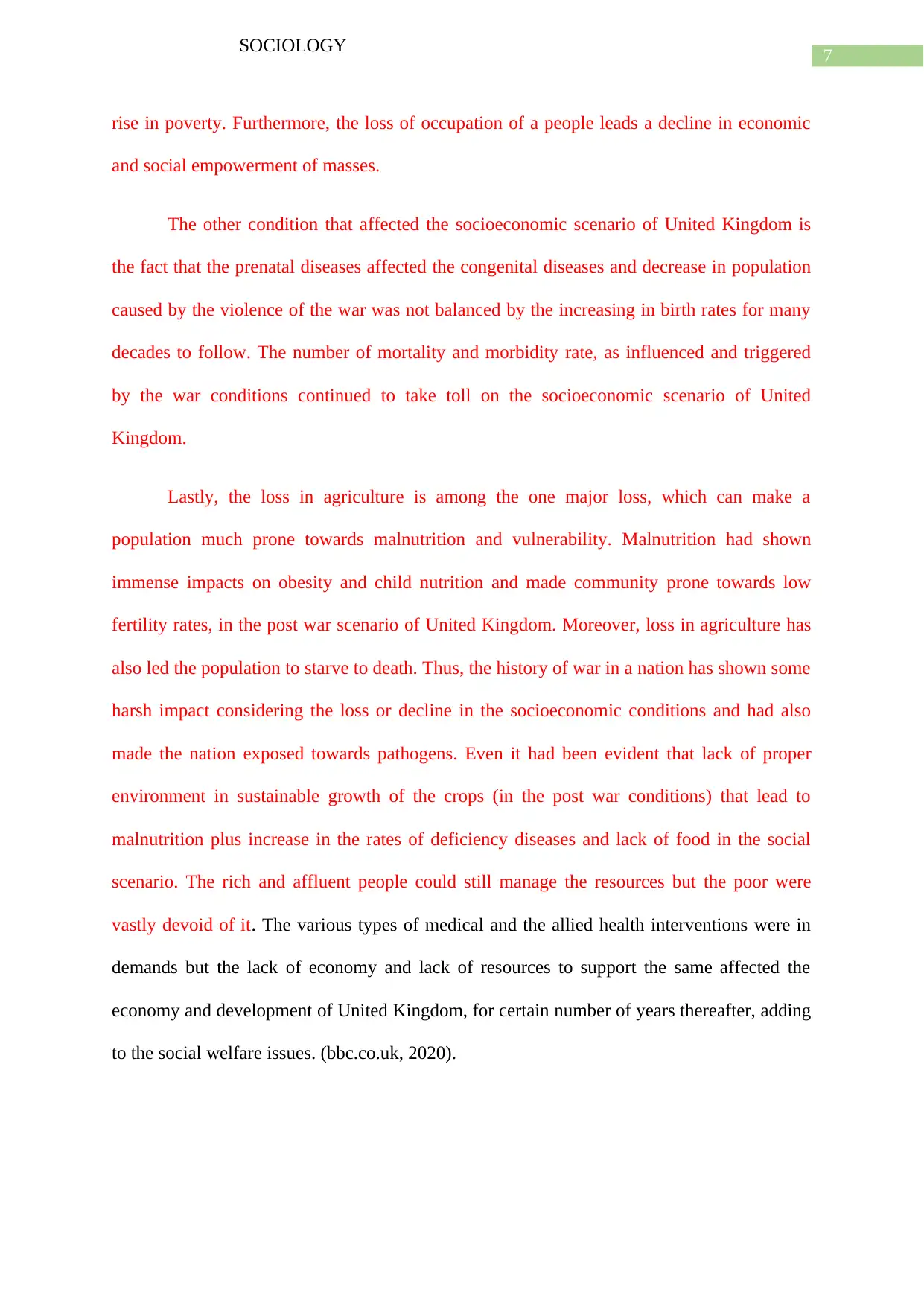
7
SOCIOLOGY
rise in poverty. Furthermore, the loss of occupation of a people leads a decline in economic
and social empowerment of masses.
The other condition that affected the socioeconomic scenario of United Kingdom is
the fact that the prenatal diseases affected the congenital diseases and decrease in population
caused by the violence of the war was not balanced by the increasing in birth rates for many
decades to follow. The number of mortality and morbidity rate, as influenced and triggered
by the war conditions continued to take toll on the socioeconomic scenario of United
Kingdom.
Lastly, the loss in agriculture is among the one major loss, which can make a
population much prone towards malnutrition and vulnerability. Malnutrition had shown
immense impacts on obesity and child nutrition and made community prone towards low
fertility rates, in the post war scenario of United Kingdom. Moreover, loss in agriculture has
also led the population to starve to death. Thus, the history of war in a nation has shown some
harsh impact considering the loss or decline in the socioeconomic conditions and had also
made the nation exposed towards pathogens. Even it had been evident that lack of proper
environment in sustainable growth of the crops (in the post war conditions) that lead to
malnutrition plus increase in the rates of deficiency diseases and lack of food in the social
scenario. The rich and affluent people could still manage the resources but the poor were
vastly devoid of it. The various types of medical and the allied health interventions were in
demands but the lack of economy and lack of resources to support the same affected the
economy and development of United Kingdom, for certain number of years thereafter, adding
to the social welfare issues. (bbc.co.uk, 2020).
SOCIOLOGY
rise in poverty. Furthermore, the loss of occupation of a people leads a decline in economic
and social empowerment of masses.
The other condition that affected the socioeconomic scenario of United Kingdom is
the fact that the prenatal diseases affected the congenital diseases and decrease in population
caused by the violence of the war was not balanced by the increasing in birth rates for many
decades to follow. The number of mortality and morbidity rate, as influenced and triggered
by the war conditions continued to take toll on the socioeconomic scenario of United
Kingdom.
Lastly, the loss in agriculture is among the one major loss, which can make a
population much prone towards malnutrition and vulnerability. Malnutrition had shown
immense impacts on obesity and child nutrition and made community prone towards low
fertility rates, in the post war scenario of United Kingdom. Moreover, loss in agriculture has
also led the population to starve to death. Thus, the history of war in a nation has shown some
harsh impact considering the loss or decline in the socioeconomic conditions and had also
made the nation exposed towards pathogens. Even it had been evident that lack of proper
environment in sustainable growth of the crops (in the post war conditions) that lead to
malnutrition plus increase in the rates of deficiency diseases and lack of food in the social
scenario. The rich and affluent people could still manage the resources but the poor were
vastly devoid of it. The various types of medical and the allied health interventions were in
demands but the lack of economy and lack of resources to support the same affected the
economy and development of United Kingdom, for certain number of years thereafter, adding
to the social welfare issues. (bbc.co.uk, 2020).
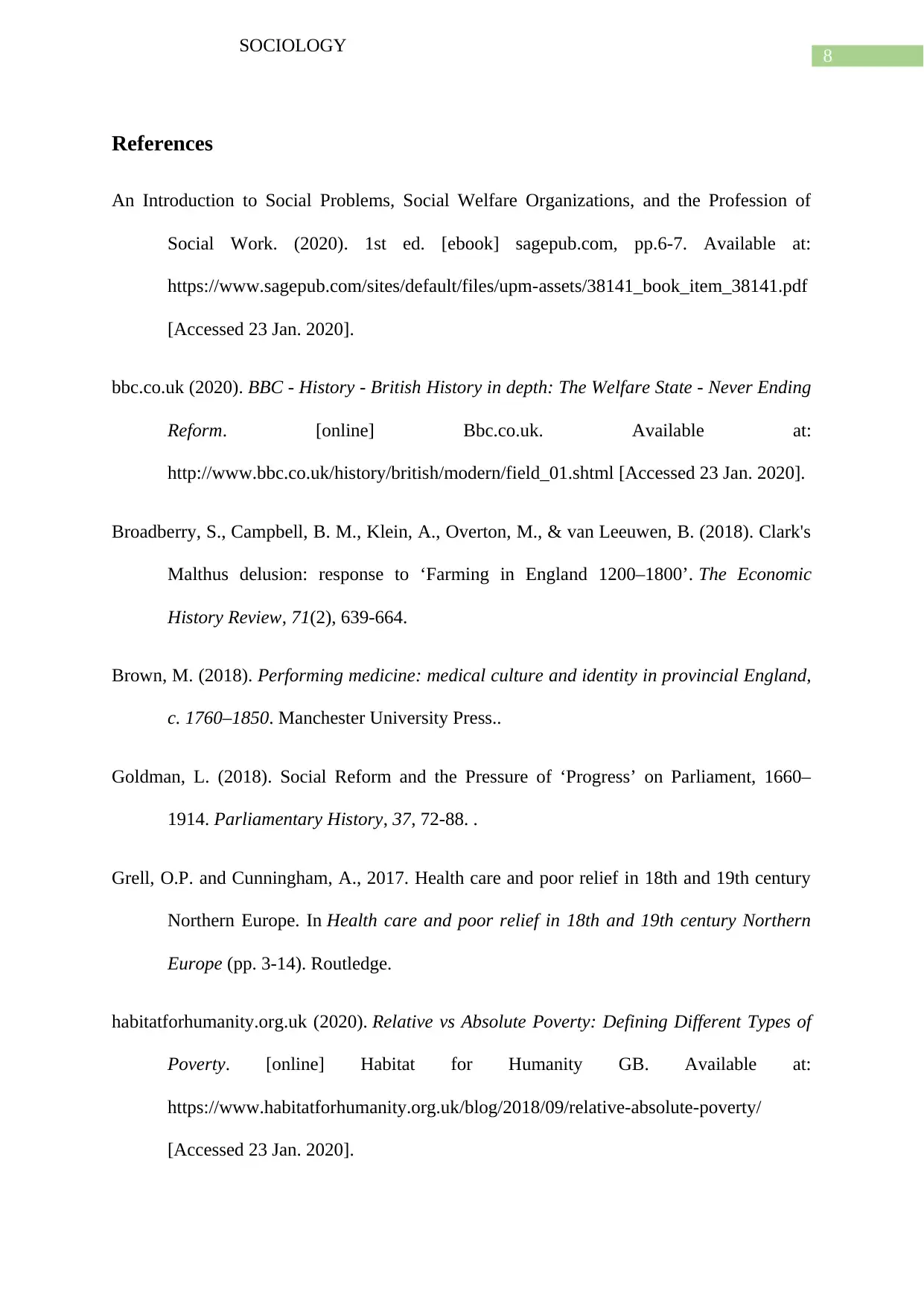
8
SOCIOLOGY
References
An Introduction to Social Problems, Social Welfare Organizations, and the Profession of
Social Work. (2020). 1st ed. [ebook] sagepub.com, pp.6-7. Available at:
https://www.sagepub.com/sites/default/files/upm-assets/38141_book_item_38141.pdf
[Accessed 23 Jan. 2020].
bbc.co.uk (2020). BBC - History - British History in depth: The Welfare State - Never Ending
Reform. [online] Bbc.co.uk. Available at:
http://www.bbc.co.uk/history/british/modern/field_01.shtml [Accessed 23 Jan. 2020].
Broadberry, S., Campbell, B. M., Klein, A., Overton, M., & van Leeuwen, B. (2018). Clark's
Malthus delusion: response to ‘Farming in England 1200–1800’. The Economic
History Review, 71(2), 639-664.
Brown, M. (2018). Performing medicine: medical culture and identity in provincial England,
c. 1760–1850. Manchester University Press..
Goldman, L. (2018). Social Reform and the Pressure of ‘Progress’ on Parliament, 1660–
1914. Parliamentary History, 37, 72-88. .
Grell, O.P. and Cunningham, A., 2017. Health care and poor relief in 18th and 19th century
Northern Europe. In Health care and poor relief in 18th and 19th century Northern
Europe (pp. 3-14). Routledge.
habitatforhumanity.org.uk (2020). Relative vs Absolute Poverty: Defining Different Types of
Poverty. [online] Habitat for Humanity GB. Available at:
https://www.habitatforhumanity.org.uk/blog/2018/09/relative-absolute-poverty/
[Accessed 23 Jan. 2020].
SOCIOLOGY
References
An Introduction to Social Problems, Social Welfare Organizations, and the Profession of
Social Work. (2020). 1st ed. [ebook] sagepub.com, pp.6-7. Available at:
https://www.sagepub.com/sites/default/files/upm-assets/38141_book_item_38141.pdf
[Accessed 23 Jan. 2020].
bbc.co.uk (2020). BBC - History - British History in depth: The Welfare State - Never Ending
Reform. [online] Bbc.co.uk. Available at:
http://www.bbc.co.uk/history/british/modern/field_01.shtml [Accessed 23 Jan. 2020].
Broadberry, S., Campbell, B. M., Klein, A., Overton, M., & van Leeuwen, B. (2018). Clark's
Malthus delusion: response to ‘Farming in England 1200–1800’. The Economic
History Review, 71(2), 639-664.
Brown, M. (2018). Performing medicine: medical culture and identity in provincial England,
c. 1760–1850. Manchester University Press..
Goldman, L. (2018). Social Reform and the Pressure of ‘Progress’ on Parliament, 1660–
1914. Parliamentary History, 37, 72-88. .
Grell, O.P. and Cunningham, A., 2017. Health care and poor relief in 18th and 19th century
Northern Europe. In Health care and poor relief in 18th and 19th century Northern
Europe (pp. 3-14). Routledge.
habitatforhumanity.org.uk (2020). Relative vs Absolute Poverty: Defining Different Types of
Poverty. [online] Habitat for Humanity GB. Available at:
https://www.habitatforhumanity.org.uk/blog/2018/09/relative-absolute-poverty/
[Accessed 23 Jan. 2020].
⊘ This is a preview!⊘
Do you want full access?
Subscribe today to unlock all pages.

Trusted by 1+ million students worldwide
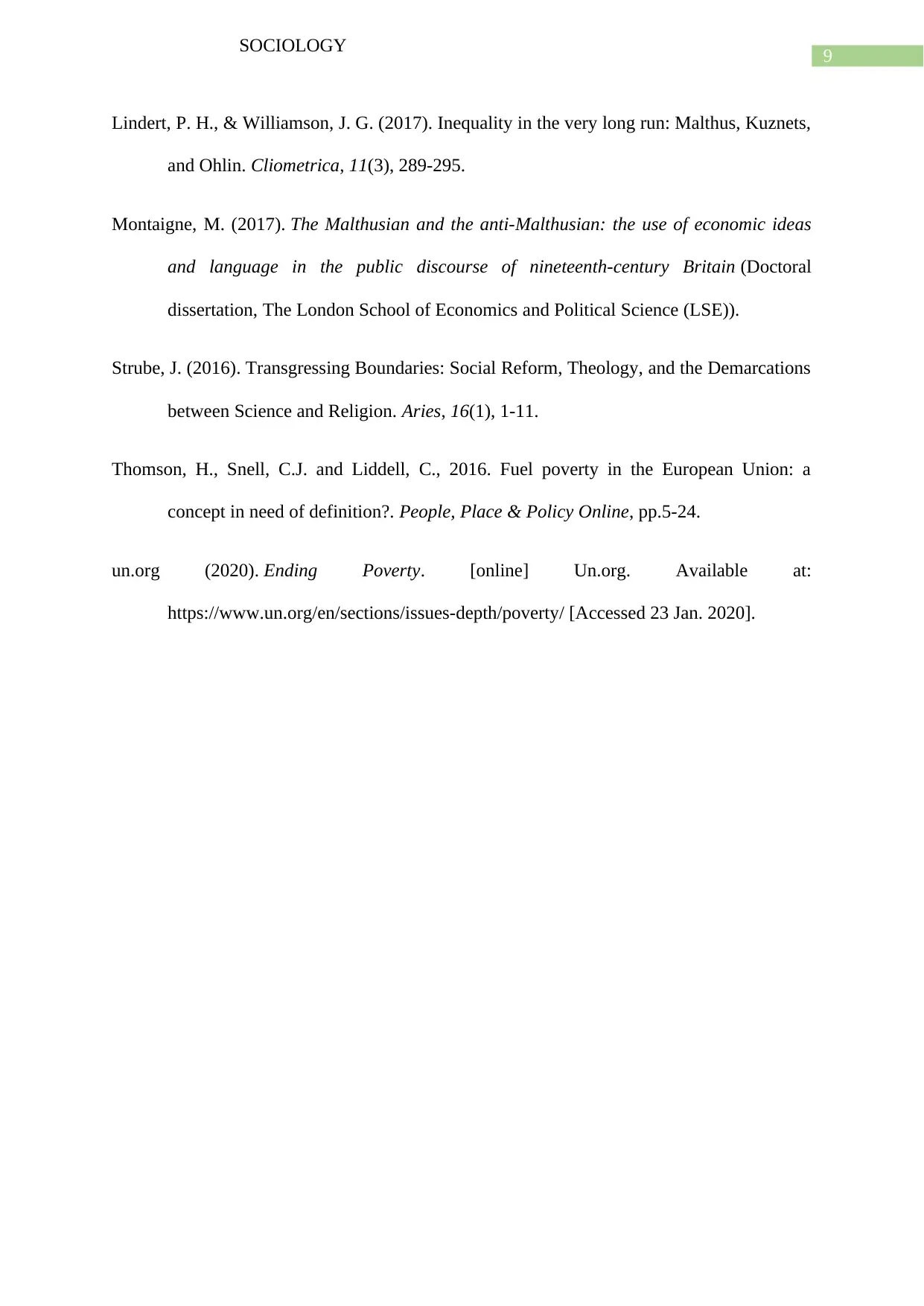
9
SOCIOLOGY
Lindert, P. H., & Williamson, J. G. (2017). Inequality in the very long run: Malthus, Kuznets,
and Ohlin. Cliometrica, 11(3), 289-295.
Montaigne, M. (2017). The Malthusian and the anti-Malthusian: the use of economic ideas
and language in the public discourse of nineteenth-century Britain (Doctoral
dissertation, The London School of Economics and Political Science (LSE)).
Strube, J. (2016). Transgressing Boundaries: Social Reform, Theology, and the Demarcations
between Science and Religion. Aries, 16(1), 1-11.
Thomson, H., Snell, C.J. and Liddell, C., 2016. Fuel poverty in the European Union: a
concept in need of definition?. People, Place & Policy Online, pp.5-24.
un.org (2020). Ending Poverty. [online] Un.org. Available at:
https://www.un.org/en/sections/issues-depth/poverty/ [Accessed 23 Jan. 2020].
SOCIOLOGY
Lindert, P. H., & Williamson, J. G. (2017). Inequality in the very long run: Malthus, Kuznets,
and Ohlin. Cliometrica, 11(3), 289-295.
Montaigne, M. (2017). The Malthusian and the anti-Malthusian: the use of economic ideas
and language in the public discourse of nineteenth-century Britain (Doctoral
dissertation, The London School of Economics and Political Science (LSE)).
Strube, J. (2016). Transgressing Boundaries: Social Reform, Theology, and the Demarcations
between Science and Religion. Aries, 16(1), 1-11.
Thomson, H., Snell, C.J. and Liddell, C., 2016. Fuel poverty in the European Union: a
concept in need of definition?. People, Place & Policy Online, pp.5-24.
un.org (2020). Ending Poverty. [online] Un.org. Available at:
https://www.un.org/en/sections/issues-depth/poverty/ [Accessed 23 Jan. 2020].
1 out of 10
Your All-in-One AI-Powered Toolkit for Academic Success.
+13062052269
info@desklib.com
Available 24*7 on WhatsApp / Email
![[object Object]](/_next/static/media/star-bottom.7253800d.svg)
Unlock your academic potential
Copyright © 2020–2026 A2Z Services. All Rights Reserved. Developed and managed by ZUCOL.

